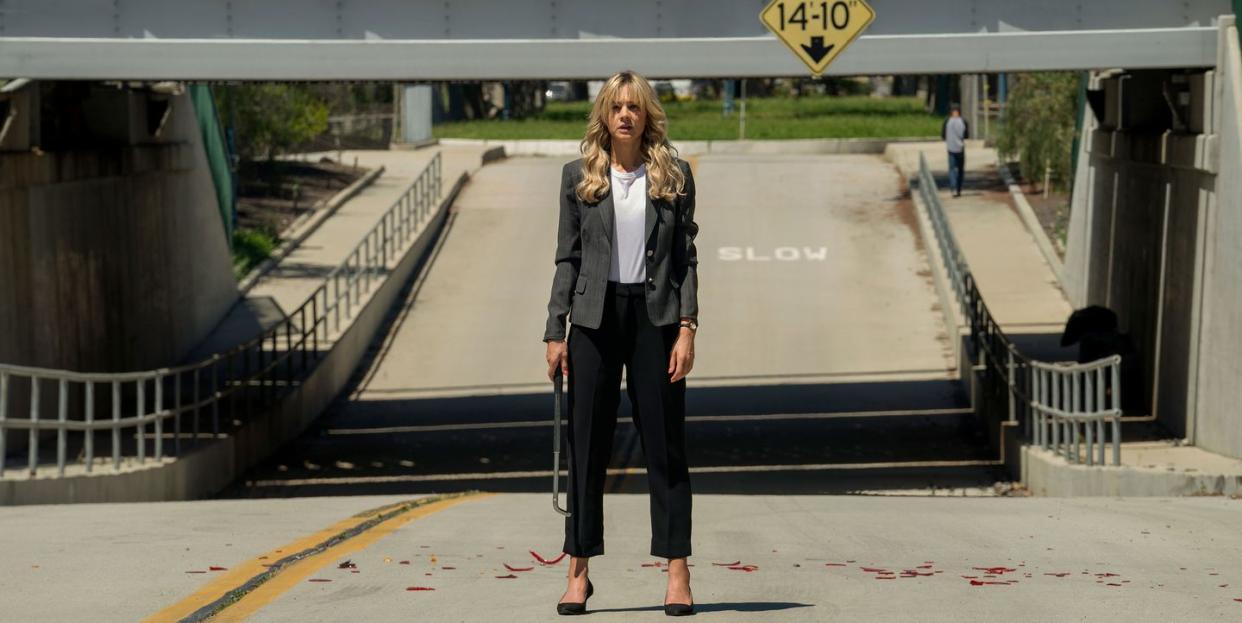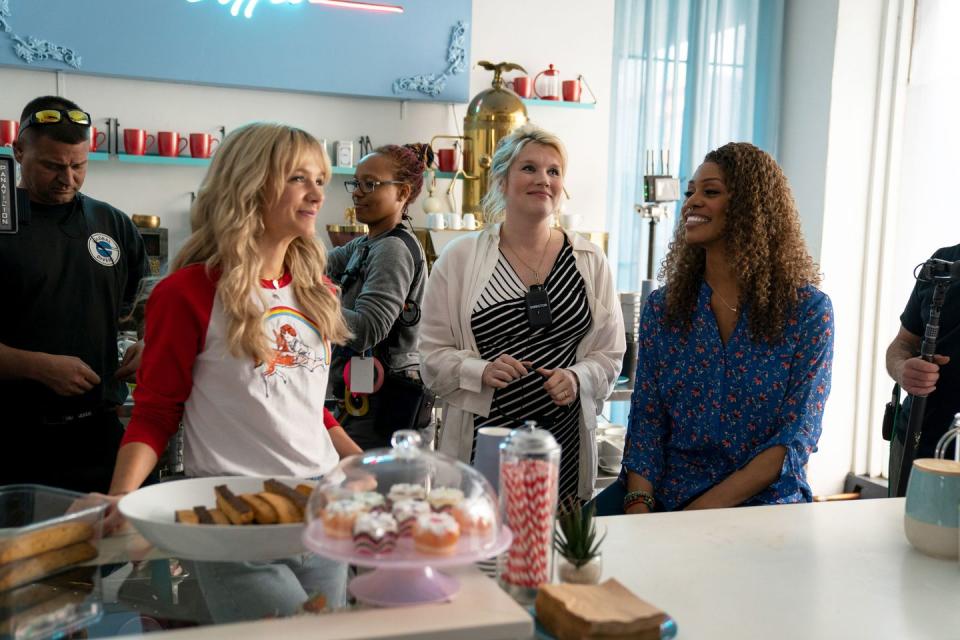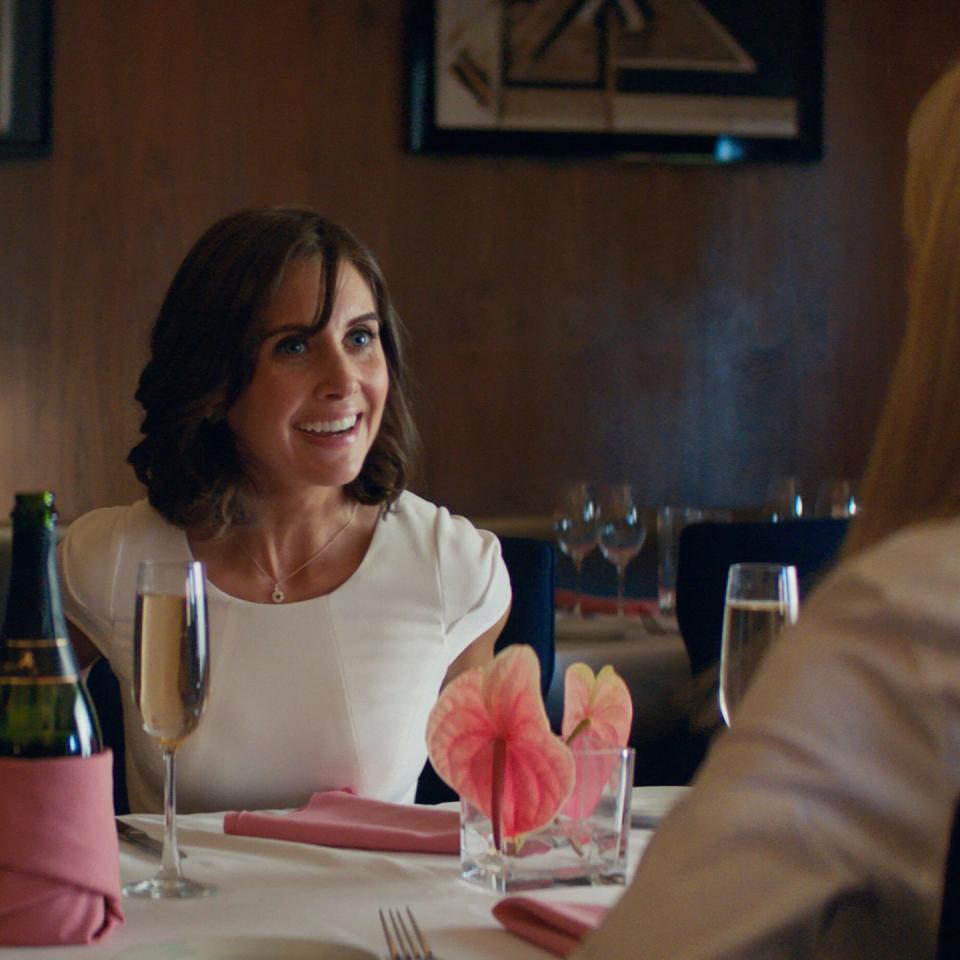Emerald Fennell Breaks Down That 'Promising Young Woman' Ending

- Oops!Something went wrong.Please try again later.
- Oops!Something went wrong.Please try again later.
WARNING: This story contains major spoilers for the ending of Promising Young Woman.
The rape-revenge thriller has a long and somewhat seedy Hollywood history. “Traditionally associated with grindhouse misogyny and BBFC-vexing video nasties, it’s a format that by its very nature hinges on sexual violence,” The Guardian wrote in a succinct summary two years ago, noting that the trope was undergoing a renaissance in the wake of the #MeToo movement. Emerald Fennell’s Promising Young Woman is perhaps the boldest and most realistic example yet of the reinvigorated genre, equipping its protagonist, Cassie (Carey Mulligan), with a simmering, righteous rage that compels her to seek systematic revenge on toxic men. What drives her is the fate of her best friend, Nina, who is never seen on-screen. Nina, just like Cassie, was a “promising young woman,” until a sexual assault left her so emotionally destroyed that she died by suicide.
“I had an idea that [her revenge] would be kind of tricky and malevolent and existentially threatening, rather than something more run-of-the-mill and AK-47 based,” says Fennell, who’s best known as Camilla Parker Bowles in The Crown and as the showrunner of Killing Eve Season 2. Indeed, there’s not a single frame of her directorial debut that could be described as run-of-the-mill. This is far from a traditional rape-revenge thriller, as Cassie doles out meticulous and crafty justice both to the men who exploit, abuse, and assault women, and to the complicit women who prop up the status quo through victim blaming and inaction.
Promising Young Woman subverts expectations throughout, but nowhere more so than in its electric and harrowing ending, which sees Cassie finally going into the belly of the beast (a frat house) to confront Nina’s rapist, Al Monroe (Chris Lowell). In doing so, she puts herself in a physical danger that doesn’t seem unusual, as we’re so used to seeing “badass women” defy the odds on-screen. But Cassie, for all her smarts, has no superpowers. So when Al attacks and smothers her, there’s no magical plot device or deus ex machina to save her. She dies.
It’s a gut punch of a final act, despite the fact that Cassie leaves behind a contingency plan ensuring that Al is jailed for her death. Below, Fennell digs deep with BAZAAR.com into that disturbing ending, the psychology behind Cassie’s “lessons,” and making a realistic movie about female vengeance.

What was the first idea, or image, that came to you in the writing process?
I think for a while, I’d been wanting to make a revenge movie about female rage, and to take the revenge trope and put a real woman at the center, with the physical limitations that most women have. We’re used to the idea of a violent journey, but I wanted to look at how a real woman might take revenge, and I had an idea that it would be kind of tricky and malevolent and existentially threatening, rather than something more run-of-the-mill and AK-47 based.
The first scene that came into my head was also how the movie begins: an incredibly drunk girl at a bar being picked up and going home with someone, him undressing her, her drunkenly saying, “What are you doing?” and then her suddenly sitting up and saying, stone-cold sober, “What are you doing?” That moment—that “What are you doing?”—is what the film is really about.
How so?
I grew up with that behavior being completely normal—incredibly drunk girls being taken home, and it being a gag. The walk of shame, not knowing who you slept with the night before, it was accepted and part of raunch culture. In which case, if this is something that society says isn’t bad, then why would the man mind if it turned out that the woman he thought was blackout drunk actually wasn’t drunk? Because by society’s logic, he would have done nothing wrong, right? So why would he be spooked or surprised or freaked out?
That seemed like a great lesson to start the film out with. Cassie is saying, “Do you see this thing? If you see it, and acknowledge it, and apologize, then no harm done. If you don’t see it, you get punished.” She’s teaching a lesson. And if you’re on a reckless, addictive cycle of wanting to release tension, that seemed to me like quite a plausible thing.
There’s a lot of ambiguity baked into the film, in terms of how far Cassie will go. For a long time, we’re led to believe she’s facilitated another woman’s rape [Alison Brie’s Madison], but that turns out to be misdirection. How did you approach walking the line with Cassie’s morality?
This is it—what’s more disturbing? The thing we’re used to seeing, which is somebody going to people’s houses and beating them up, torturing them, murdering them? Which is kind of something we’re really comfortable with—even in this film, by the end, the audience are baying for fucking blood, and the satisfaction when the weapon comes out is enormous. So we’re used to that. But what we cannot abide is what Cassie does, which is actually … nothing. Really, she does nothing. She just gives people an idea. With Alison Brie, she’s showing her, in the simplest way she can, that her argument is bullshit, because once it applies to her, it’s null and void. What she does is kind of terrifying, because you can’t stick it on her. She didn’t do anything. She just talked and implied things.
When it comes to Cassie as a character, I love her and respect her, but she’s not necessarily nice. After years and years of being told that the thing that you believe is wrong, that you need to just shut up and get over it, there’s a reason she’s been doing her weekly tension releases with these strangers. She’s trying to put all of that energy that she feels about something very personal elsewhere, because she knows if she looks at the thing that she’s really angry about, she will lose all control. And her whole life is about control.

So there’s something kind of compulsive about her desire to teach these lessons, in this very structured way.
Yeah, she’s meticulous about everything—about everything she wears, about how she presents herself, about how she speaks. She’s guarded, completely strict. But she knows the moment she looks up Al Monroe’s name, she’s doomed. I think the control that she shows is quite remarkable, and it’s important that you see the repercussions. There’s a reason that she smashes up someone’s car after that scene with Dean Walker [Connie Britton], because she’s not just angry. She’s ashamed. She’s frightened by herself, and then in the scene after that, Ryan [Bo Burnham] points out that she’s noticeably wired. And that’s what happens when you’re using.
The ending is incredibly bleak. What I took from it is that Cassie knew Al was never going to face justice for what he did—because let’s face it, most men who do what he did don’t. So the only way she could get him to face justice is for her to die, and he goes to jail for her murder.
I think yes, except I don’t think that’s precisely what she meant. The thing for me with Cassie is that she’s absolutely not on a suicide mission. But she’s wise enough and reckless enough to know that this, whatever happens here, either she’s going to jail or she needs to make a contingency plan. Because young women don’t go into houses full of 20 huge men.
And this is another thing, it was important to me that if the audience is expecting, or wanting violence, then this is what happens when women try to be violent. It’s why we don’t ever try to be violent. Because it goes wrong. No matter how clever she is, no matter how meticulously planned it is, it’s very, very difficult to physically fight a man if you’re a small young woman, or any woman really. So part of it for me was just the reality of the situation.
What happens to her is dreadful, and I think the way she fights for her life proves that this is not the outcome she wanted. But she’s also desperate. And she’s so desperate that she does something incredibly dangerous, and she kind of acknowledges it might be too dangerous by the fact that she has a contingency plan. But let’s say, even if she had carved Nina’s name all over [Al’s] body and maimed him horribly, then she goes to prison. What’s the happy ending for her, going into that place? There is none.
Was this the only ending you considered?
Yes. It was the only ending that felt real to me. I think for everyone who came on board the film, the reason they loved it was that it just felt true to them, it felt horribly real. That’s not to say it’s not incredibly devastating and grueling to watch. But I just couldn’t see it any other way. I wish I could! I wish I could have let myself, and everybody else, off the hook, because there is, of course, a hypothetical alternative ending to this movie that is incredibly satisfying. But then, what’s the point? That would be kind of the opposite of the film I wanted to make.
I hope that we still feel her presence at the end, and feel at least that she took them down with her. It’s not that she sacrificed or martyred herself, I don’t think that’s true, but she knew if she was going down, she was going to fucking take them down too. And she was going to do it in the middle of his wedding! She at least knew she could do that.
The casting is very canny. You have male actors who are beloved from other roles—Adam Brody from The O.C., Max Greenfield from New Girl—playing these subtly toxic men. How conscious were you of their places in pop culture?
First and foremost, I just think they’re all unbelievable actors, and I think comic actors don’t often get the opportunity to play these kinds of roles, and they’re usually really, really good at it. Comedians tend to be much more comfortable going for the jugular, because it’s where they like to be anyway. But I think like everything in this movie, appearances are deceiving. These guys are not the obvious creeps and villains. They’re the kind of people who think they’re good, and the audience comes in with an expectation that they’re good and trustworthy. Like Connie Britton and Alison Brie as well, these are people that we like.
It had to feel that uncomfortable. With the one-sided kiss between Adam Brody and Carey Mulligan, there’s something so extra horrifying about it, because Adam is such a heartthrob. Because it’s so unexpected. If he were just a horrible, obviously scary creep, it wouldn’t have the same impact. Here, it’s like, “Oh fuck, this guy thinks he’s in a romantic comedy. He just doesn’t realize he’s the only person in it.” I wanted all of these people Cassie confronts to come into it believing they’re a good person. Because how would any of us react?
How would you react, if someone from 10 years ago knocked on your door and said, “Do you remember this thing? Because you ruined my life.” What would any of us do? We’d probably double down and go, “No, actually I’m nice, and what really happened is this,” and not admit to it. That’s all Cassie ever looked for, is acknowledgement. She doesn’t want to punish anyone. She actually wants to just fucking let go so she can have a rest, but no one will admit that something happened. Except the lawyer, and that’s really important. That shocks her, because it’s very rare that people do what he does.
The movie feels incredibly taut and disciplined, with no extraneous scenes at all. Was there anything you’d planned to include that was cut?
Not really, because we were on an unbelievably tight timeframe—we shot it in 23 days. Which obviously for a film with this kind of cast and the number of different locations, it’s not like we were shooting it in a house. I remember I was with my amazing producer Fiona [Walsh Heinz], and we were looking at the schedule before we started shooting and she was like, “We are … probably a centimeter away from impossible here.” So that meant we just needed a huge amount of discipline and preparation. If we dropped one scene, we were doomed. But I’m a masochistic monster, so I like that kind of stuff! I like parameters. I think because Focus [Features] came on board, people think it’s a studio movie, which is lovely, because we wanted it to look like one. But it’s very much independent, and got done by the skin of our teeth!
This interview has been edited and condensed for clarity.
You Might Also Like

